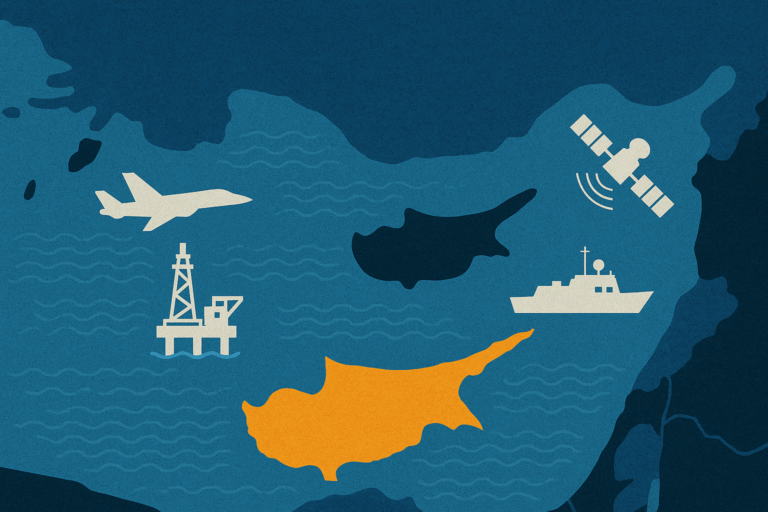Greece’s intelligence service on Wednesday declassified 58 intelligence reports connected to the Greek-led coup in Cyprus in 1974 and the subsequent Turkish operation, giving an inside account of the historic events for the first time.
The redacted documents shed light on the Greek perspective between July and August 1974 and have been released to contribute to a more comprehensive understanding of what happened, Greece’s National Intelligence Service (EYP) said in a statement.
The move coincided with the 50th anniversary of events in Cyprus, whose impact is still felt. In 1974, the Greek-led coup prompted a Turkish operation and led to the division of Cyprus, which persists today.
“Fifty years is quite a long and therefore quite safe period, which, even if it doesn’t force you to, allows you to look back in an exercise of national but also of professional self-awareness,” EYP director-general Themistoklis Demiris said.
Reports from early to mid-July 1974 focus almost entirely on simmering tensions between Greece’s military junta, which had seized power in Athens in 1967, and Cyprus.
Agence France-Presse (AFP) reported that, according to Evanthis Hatzivassiliou, a professor of postwar history at the National University of Athens, the documents were of “critical importance.”
The archives reveal that the intelligence agency was “not informed” of the attempted coup organized by the Greek junta, Hatzivassiliou said.
“The (junta) … informed only those absolutely necessary,” he said. After the coup, the agency was “quite accurate” in describing Turkish preparations for the operation, but the warnings were ignored in Athens, he said.
One report, dated July 2, 1974, recounts the “shrill” warnings of Cypriot officials who wanted the Greek military presence in Cyprus to be curbed. Another expressed concern about a Communist takeover should the Greeks leave.
Subsequent reports focused on military hostilities and army movements in Cyprus and Greece, which had issued a general mobilization alert in the wake of the developments.
Critical timing
The move also came as Greece and Türkiye, NATO allies, sought to improve their shaken relations through diplomacy.
Speaking to Daily Sabah, Kaan Cenk Adasoy, an expert on the Cyprus issue and Türkiye-Greece relations, deemed Athens’ declassification a “gesture” to mend relations.
“For the past year, Athens has successfully fostered positive relations with Türkiye. It appears that releasing these archival documents on the 50th anniversary of the Cyprus intervention is a deliberate move amid the renewed neighborly ties,” he said.
“This gesture suggests an intent to distance Greece from the U.S.-aligned faction and extend a hand toward Türkiye.”
For Adasoy, in recent years, “Greece has been deeply divided between those aligned with the U.S. and Western imperial interests and those who oppose this influence.”
He furthered, “Critics argue that the U.S., which has recently established numerous military bases in Greece, jeopardizes Greece’s sovereignty and has significantly strained relations with Türkiye, as evidenced by political intrigues.”
“The declassified documents indicate that Greece’s intelligence agency, as a representation of the modern Greek state, seeks to dissociate from the military dictatorship of that era,” he said.
“In doing so, Greece implicitly assigns responsibility for the root of the Cyprus issue to the dictatorship – a period now viewed as a “dark time” – while signaling goodwill toward Ankara.”
EYP and surveillance
The Greek spymaster also said that the agency would go on to declassify additional documents referring to “dark” periods of Greek history without elaborating.
The agency, which is supervised by the prime minister’s office, in 2022 was embroiled in a major wiretapping scandal when it emerged that several ministers and other officials were revealed to have been under state surveillance.
In addition, dozens of people, including EYP’s own in-house prosecutor and the chief of police, were also found to have been targeted with illegal malware known as Predator.
Though the purpose of the state wiretaps was classified and never disclosed, Prime Minister Kyriakos Mitsotakis later told parliament that the monitoring by EYP was legal.
The then-EYP chief and Mitsotakis’ nephew, who was a top aide in his office, both resigned when it emerged that senior politician Nikos Androulakis, who later became the leader of the Greek socialist party, was among those under legal surveillance.
Despite numerous queries, Androulakis has received no official answer about why he was under state surveillance.
Critics have said valuable time was lost in launching the investigation, compromising key evidence.




